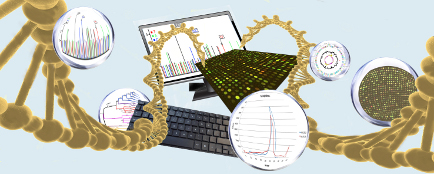Home
Next Generation Sequencing (NGS) is currently the main source of data to be analyzed in genomics. The amount of NGS data produced has increased in several orders of magnitude and so has the size of data files. All this makes hard the development of webtools that can efficiently handle such inputs, consequently reducing the analysis options or requiring an advanced bioinformatics background to be able to perform several types of analysis.

* Illustration by Iñaki Lazaro.
Full sets of secreted proteins, called secretomes, have been studied for a variety of organisms to understand the potential role of those proteins involved in crucial metabolic pathways and complex health conditions.
Here, we present the webtool PECAS that allows users to gain access to a well established analysis pipeline on prediction of secreted proteins. This tool overcomes previously mentioned NGS issues and enables potential users to carry out predictions of secreted proteins in a single submission step (through the web interface) avoiding big data management issues. PECAS users can perform classical secretome analysis (which is not currently offered in a pipeline format anywhere) on their sequences of interest by submitting their NGS data in a wide range of formats: Id list (IDL), table of counts (ToC), differential expression table (DEt) or even FASTA file. This variety of input options avoids the heavy data traffic generated by NGS files and also allows users to retain most sensible sequence data not entering in conflict with future use of it (in cases such as patents or other data management restrictions).
Cite us:
PECAS: prokaryotic and eukaryotic classical analysis of secretome.
Cortazar AR, Oguiza JA, Aransay AM, Lavín JL.
Amino Acids. 2015 Dec;47(12):2659-63. doi: 10.1007/s00726-015-2058-2. Epub 2015 Aug 2.


